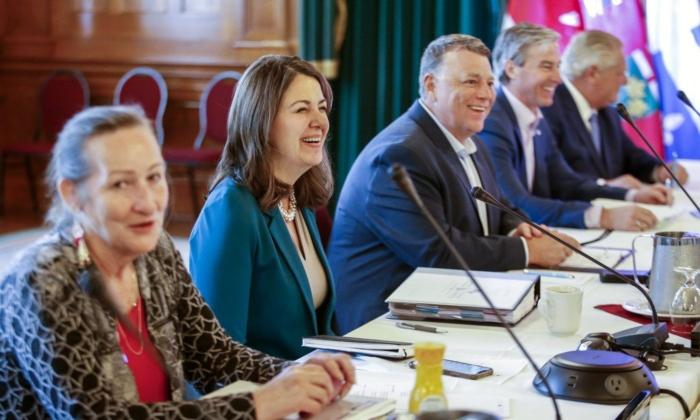The call was made during the closing news conference on July 12 following the three-day national meeting of premiers in Winnipeg. Discussion included the cost-of-living crisis facing many across the country.
“This is devastating news for families,” said Mr. Eby. “We haven’t seen the full impact yet. People have not renewed their mortgages yet. And the businesses that are struggling under debt have not started going under yet, but they will. Those jobs will be lost and it won’t just be in British Columbia, it will be across the country.”
Mr. Eby said that’s where a national infrastructure plan could make a difference.
“The long-term strategy to addressing inflation, in my opinion, is high-quality infrastructure that gets our exports out to global market and gets our imports in with a minimum amount of friction so its cheaper for British Columbians and for all Canadians.”
Ontario Premier Doug Ford said while he understands the BoC is trying to control inflation, ordinary Canadians are the ones getting hurt.
“What’s the ramification of this? When these people have to renew their mortgages and they can’t afford it? This isn’t good for the country,” said Mr. Ford.
Almost all premiers pointed to the rising cost of energy as a key factor in the cost of living, and accused the federal government of having inflexible climate policy goals that are driving up the cost in nearly every sphere.
In late June, Atlantic premiers called on the federal government to roll back the cost of the new clean fuel regulations because of their impact in Atlantic Canada.
Prince Edward Island Premier Dennis King said it’s all part of a bigger picture.
“I think this particular issue for Atlantic Canada is reflective of other issues that take place in other jurisdictions across the country … where we feel there’s a disconnect in the conversations that we’re having at the federal level,” he said.
“These are important issues—pocketbook issues that are hurting Prince Edward Islanders, they’re hurting Atlantic Canadians, and we don’t need to go down this road.”
His frustration was picked up by New Brunswick Premier Blaine Higgs.
“So, it just comes to the piling on of additional costs. And then wondering, well, why are we seeing inflation? Why are we seeing, you know, bank rates continuing to climb to try to control that? Why are we seeing such … an ongoing escalation of prices in every commodity?” he asked. “Let’s get some recognition for the impact this is having on everyday lives.”
Saskatchewan Premier Scott Moe said Western Canada is facing similar problems.
“When you layer on policy after policy after policy, there’s costs to those policies,” he said. The premier pointed to Alberta, which is looking at expanding carbon capture as one way to reduce greenhouse gas emissions.
“As they look at carbon capture and storage on many of their projects, it’s in the tens of billions [of dollars],” said Mr. Moe. “That cost is going to arrive either in a lack of competitiveness to one of the largest economic engine industries in this nation, or it’s going to land at the fuel pumps for each of us when we are going to fill up our own vehicles and likely is going to also land with continued inflationary pressures that we see for items at the grocery store,” he said.
“The problem with the federal approach is that it’s all stick and no carrot,” added Alberta Premier Danielle Smith. “We’re just trying to encourage the federal government to think a little bit more creatively about how we can have both—Norway has managed to figure out how to have both. … We are just asking for them to understand that they have put us in a position of creating an enormous affordability crisis, because they keep on loading up cost after cost after cost. And they’re not doing the work that needs to be done to make sure that we’ve got access to markets,” she said.
Nova Scotia Premier Tim Houston said the cost of living will be a key issue at an upcoming meeting with federal members of Parliament.
“We’ll try again next week with the Atlantic members of Parliament and have a direct conversation with them in Moncton because they should also see it from their own constituents,” he said. “The question will be whether they have the courage to speak up about what they see, and I hope they do.”
Manitoba Premier Heather Stefanson chaired the meeting and said a strong economy will be important in making life more affordable.
“Which is why we’re calling for this First Ministers Meeting with the prime minister to ensure we can sit down and talk about what it means for a National Trade Corridor infrastructure strategy,” she said.
“And that’s going to be absolutely critical moving forward making sure that we can get our goods to market.”





